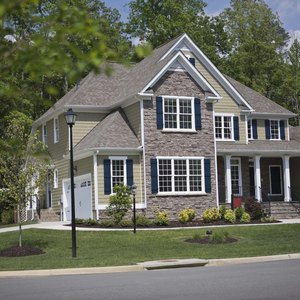
Purchasing a house is one of your largest investments and one of your longest commitments. The decision to pack-up your belongings and memories and sell your house should not be made lightly. On the other hand, sometimes it’s better to start fresh with a new house. There are several factors that determine whether you should stay and fix up an old house or sell and buy a new house.
The Age of House
The age of the house determines how much renovation work will be needed to bring it up to par. Older homes typically need new plumbing and new electrical work. In addition, they often have cracks in the foundation and usually need a new roof. On the other hand, a new home -- if it’s built properly -- won’t need any foundation, plumbing or electrical work for a long time.
The Age of the Occupants
The age of the occupants is as important as the age of the house. If the home is already paid for -- or the mortgage has been paid down significantly, older inhabitants may not want to assume a costly, new mortgage. They may choose to live in the present house with its imperfections and warts, and perform small renovations over a period of time. However, young parents with a growing family may have more money to spend on a new house –- and less energy and patience to add a messy and time-consuming renovation project to their already busy schedules.
The Location
If the house is in a prime neighborhood, consider staying and fixing it up. It’s better to have the worst house in a high-priced neighborhood than the best house in a low-priced neighborhood, simply because the worst house can always be fixed up. So before selling your house, you need to determine how important you consider the location. If you have children, the area's school system is usually a crucial factor, and you probably want a family-friendly neighborhood with parks and quiet streets where the kids can ride their bikes. If transportation is an issue, you’ll want to be close to public transit and shopping centers, so consider these factors as well.
The Needs of the Occupants
When deciding to fix up your house, consider if these changes will meet your needs. For example, if the house is on a small lot, you may never be able to build a garage or a pool. Also, if there are five or six people living in your house and you only have one bathroom, with no space for additions, installing heated floors, granite tiles and a spa shower cannot compensate for not having enough bathrooms for all of the family members.
The Cost
The final determining factor is the cost of the renovation compared to the cost of purchasing a new home. The price of a new house will vary depending on the location and size. However, Remodeling Magazine’s 2013 Cost vs. Value Report notes that the national average for adding an attic bedroom is $47,919, while a bathroom addition is $15,782 and a bathroom addition is $37,501. A minor kitchen remodel is $18,527, while a major kitchen remodel is $53,931. It’s important to add up the total cost of fixing up a house and compare it to the price of a new house to determine the best course of action.
References
Writer Bio
Terri Williams began writing professionally in 1997, working with a large nonprofit organization. Her articles have appeared in various online publications including Yahoo, USA Today, U.S. News & World Report University Directory, and the Center for Digital Ethics and Policy at Loyola University Chicago. Williams has a Bachelor of Arts in English from the University of Alabama at Birmingham.

